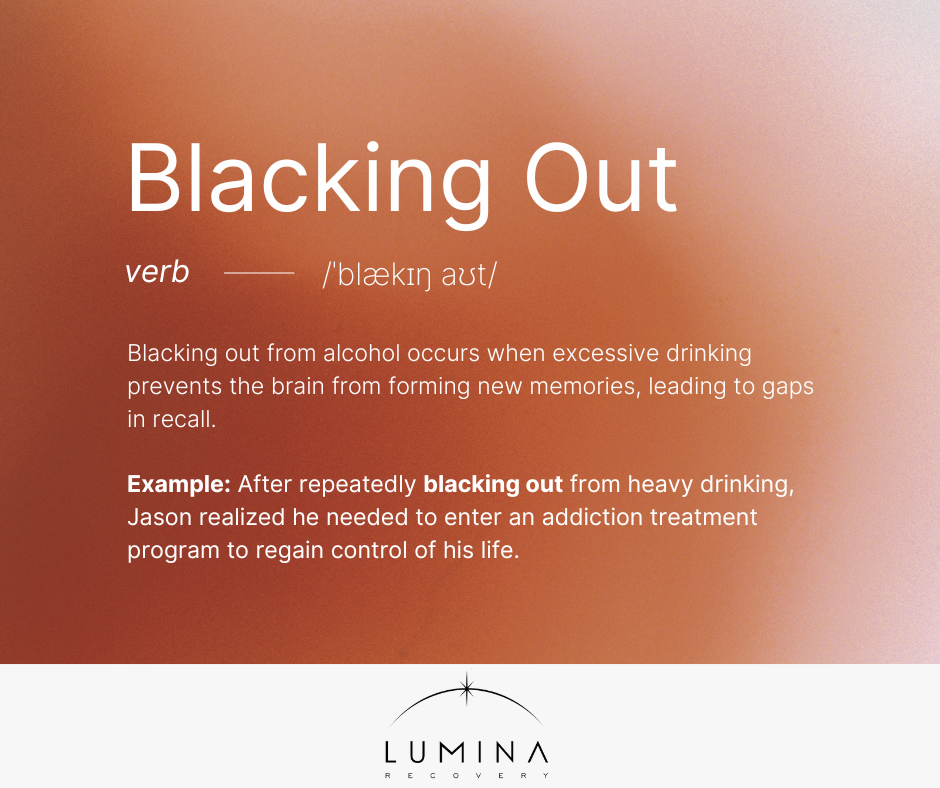Blacking out from alcohol occurs when excessive drinking prevents the brain from forming new memories, leading to gaps in recall. Unlike passing out, a person in a blackout remains conscious but has no recollection of events.
Alcohol-induced blackouts are common among college students and young adults, particularly those who engage in binge drinking or consume large amounts of alcohol quickly. Understanding the causes, risks, and long-term effects of blackouts can help prevent dangerous behaviors and alcohol-related harm.
What Are Alcohol-Induced Blackouts?
Blacking out occurs when alcohol interferes with the brain’s ability to store long-term memories. The hippocampus, the region responsible for memory formation, is particularly affected by alcohol, which prevents the encoding of new information.1 As a result, a person may spend an entire night drinking and socializing, yet wake up with no memory of what happened.
There are two types of blackouts, classified based on the severity of memory loss:
- An en bloc blackout, also called a complete blackout, causes total amnesia for the duration of intoxication. A person experiencing this form of blackout will be unable to recall events, no matter how many reminders they are given. The memories were never stored, making it impossible to retrieve them.
- A fragmentary blackout, sometimes called a brownout, is a partial memory loss where bits and pieces of the night may come back when prompted. This type of blackout is more common and often not recognized until someone else fills in the gaps the next day.1
Causes and Risk Factors for Blackouts
According to the National Institute on Alcohol Abuse and Alcoholism, alcohol-induced blackouts can occur when blood alcohol concentrations (BACs) reach 0.16% or higher, nearly twice the binge drinking threshold of 0.08%.1
At this level, the brain struggles to form new memories, and key cognitive functions like judgment, impulse control, and decision-making become severely impaired. This makes blackouts especially dangerous, increasing the risk of accidents, risky behaviors, and alcohol poisoning.
How Blackouts Happen
Several factors can increase the risk for blackouts, including:
- Rapid drinking – When alcohol is consumed too quickly, BACs rise at an accelerated rate, preventing the brain from storing memories.
- Drinks on an empty stomach – Without food to slow alcohol consumption, BACs spike faster, making blackouts more likely.
- Mixing alcohol with medications – Certain drugs, especially sleep aids and anti-anxiety medications, can make blackouts happen at much lower BACs.
- Binge drinking – Drinking large amounts of alcohol in a short period can quickly push BACs into blackout territory.
Women are generally more prone to blackouts than men because of physiological differences in alcohol metabolism. Genetics can play a role, as some people are more predisposed to experiencing blackouts based on how their bodies process alcohol.
The Dangers of Alcohol-Induced Blackouts
Blackouts pose both immediate and long-term dangers. In the short term, a person experiencing a blackout may engage in risky behaviors without realizing it. Actions such as drunk driving, unprotected sex, vandalism, or aggressive behavior can have serious consequences, yet the person may have no recollection of making those choices.
Repeatedly drinking to the point of blackout increases the risk of developing a dependence on alcohol. Over time, heavy alcohol consumption can lead to permanent cognitive impairments, making it more difficult for the brain to retain new information.
In addition to its impact on memory formation, chronic alcohol use can contribute to neurological damage. People who regularly experience blackouts and damage their frontal lobe may suffer long-term changes in brain function, particularly affecting long-term memory, personality, and decision-making abilities.2
When to Seek Help for Alcohol-Related Issues
Experiencing a single blackout may not necessarily indicate a drinking problem, but frequent blackouts are a red flag for alcohol abuse and alcoholism. If blackouts become a regular occurrence, it may be time to evaluate drinking habits and seek support.
Some signs that indicate problematic drinking include:
- Drinking despite negative consequences
- Feeling unable to control alcohol intake
- Using alcohol as a coping mechanism for stress, anxiety, or depression
For individuals struggling with frequent blackouts, professional help is available. Detox programs provide a safe, supervised environment for managing alcohol withdrawal, while outpatient treatment programs offer therapy and support for long-term recovery.
Addressing the root causes of excessive drinking can help break the cycle of blackouts and prevent lasting damage to brain function.
FAQs
What is the difference between blacking out and passing out?
Blacking out refers to memory loss during intoxication while remaining conscious. A person can still interact with others but will not remember those moments. Passing out, on the other hand, means losing consciousness entirely due to excessive alcohol consumption.
Can blacking out from alcohol cause permanent brain damage?
Frequent blackouts can contribute to cognitive decline, memory impairment, and an increased risk of neurodegenerative diseases. While one blackout may not cause lasting damage, repeated episodes can negatively impact brain function.
How can I tell if I’m about to blackout?
Warning signs of an impending blackout include difficulty remembering recent conversations, slurred speech, impaired coordination, and an inability to focus. If these symptoms appear, stopping alcohol consumption is advised.
Are some people more prone to blacking out than others?
Yes. Genetics, gender differences (women typically experience blackouts more easily), and drinking patterns all affect a person’s susceptibility. Binge drinking and consuming large amounts of alcohol in a short time also increases blackout risk.
What should I do if someone blacks out from drinking?
If someone is experiencing a blackout, ensure their safety by staying with them and keeping them hydrated. If they become unresponsive or show signs of alcohol poisoning, seek medical help immediately.
Protect Your Health and Well-Being With Lumina Recovery
Alcohol-induced blackouts can have dangerous consequences, from impaired decision-making to long-term cognitive damage. Recognizing the risks and taking proactive steps to prevent blackouts can lead to safer drinking habits and a healthier lifestyle.
For those struggling with frequent blackouts or signs of alcohol abuse and alcoholism, Lumina Recovery offers comprehensive detox, inpatient treatment programs, and outpatient treatment programs to help individuals regain control of their lives from alcohol abuse.
Contact us today to take the first step toward a sober, healthier future.
Sources:
- National Institute on Alcohol Abuse and Alcoholism. Interrupted Memories: Alcohol-Induced Blackouts.
- Healthline. Understanding Why Blackouts Happen.




